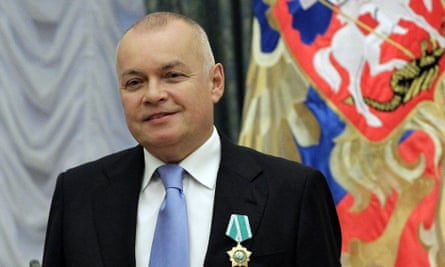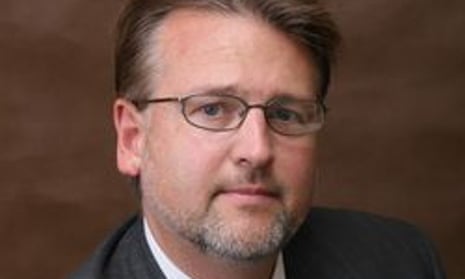A United States citizen has been fired as vice-rector of a Russian university and has left the country after state television suggested he was harming national interests, joining a growing number of foreign specialists to face pressure amid anti-western rhetoric.
Lobachevsky State University of Nizhny Novgorod said in a statement that its vice-rector for innovation, Kendrick White, had been relieved of his duties as part of a “restructuring of the management system”. Colleagues quoted by the Kommersant newspaper said White, who is also the chief executive of the Russia-focused investment consultancy Marchmont Capital Partners, had flown to Florida.
The statement said the decision to fire White had been made on Friday. But it was published after Dmitry Kiselyov, a well-known television host and head of the Rossiya Segodnya (Russia Today) state media agency, questioned the American’s activities during a Sunday broadcast about a proposed “patriotic stop list” of US non-governmental organisations allegedly working to undermine Russia.

Kiselyov named White as a candidate for the stop list, which is being discussed by the upper house of parliament. “To this day, it’s not clear how a US citizen, an entrepreneur from Washington, got this position,” Kiselyov said, claiming that White had hung portraits of American scientists in place of Russian ones.
Despite the reference to Washington DC, White’s biography on the Marchmont website says he studied in Florida and Illinois and worked in Chicago before moving to Russia in 1992.
White told the Guardian by email that he was on vacation in Florida but would be returning to Russia this weekend. “What I am going to find there is absolutely not clear to me now that I am proposed to be on some sort of stop list,” White said. “But I plan to meet with the university to try to better understand the situation with my good friends and colleagues there.”
At least half a dozen western academics have been fined or expelled from Russia over visa issues in the past year as tensions with the west have risen. In addition, three employees of the Danish Institute Against Torture taking part in a seminar were ordered to leave Russia in May, and Jennifer Gaspar, an American NGO employee, was deported in August as a “threat to national security”.
Earlier in June, Scott Blacklin, the former president of the American Chamber of Commerce in Russia, was detained for two weeks and then expelled from Russia for a visa violation. Blacklin came to give a lecture at a technology conference at Lobachevsky University, an activity that migration authorities said was incompatible with the business visa he had received.
Laura Sumner, a history graduate from the University of Nottingham, was ordered to leave Russia in April for conducting research in Nizhny Novgorod archives on a business visa, although a pro-Kremlin tabloid suggested she was a spy.
The Association for Slavic, East European and Eurasian Studies said in a statement before Sumner’s expulsion that several researchers had had problems in the country due to a “stricter enforcement of its visa regulations, particularly in certain localities”.
After a pro-western government came to power in Kiev last year, Russia has seen a rise in patriotism and cold war-style rhetoric, with state television frequently reporting on alleged US aggression and president Vladimir Putin warning of a “fifth column” subverting the country from within.
On Thursday, Putin’s spokesman accused Ukraine of “complete intolerance for pluralism” after its security service expelled a reporter with Russian state-owned Channel One, claiming she was part of a “propaganda campaign by Russian intelligence services”. Relations between the two countries are hostile amid a simmering Russia-backed insurgency in eastern Ukraine.
Since 2012, Russia has had a law on “foreign agents”, under which NGOs receiving funding from abroad for allegedly political activities can be labelled with a term synonymous with spy and subjected to audits. But tensions were raised even further in May when Putin signed a law on “undesirable” organisations that allows foreign or international NGOs to be shut down and stipulates fines or even jail time for Russians who have worked with them.
“Western special services continue their attempts at using public, non-governmental and politicised organisations to pursue their own objectives, primarily to discredit the authorities and destabilise the internal situation in Russia,” Putin told senior security officials in March.

Comments (…)
Sign in or create your Guardian account to join the discussion